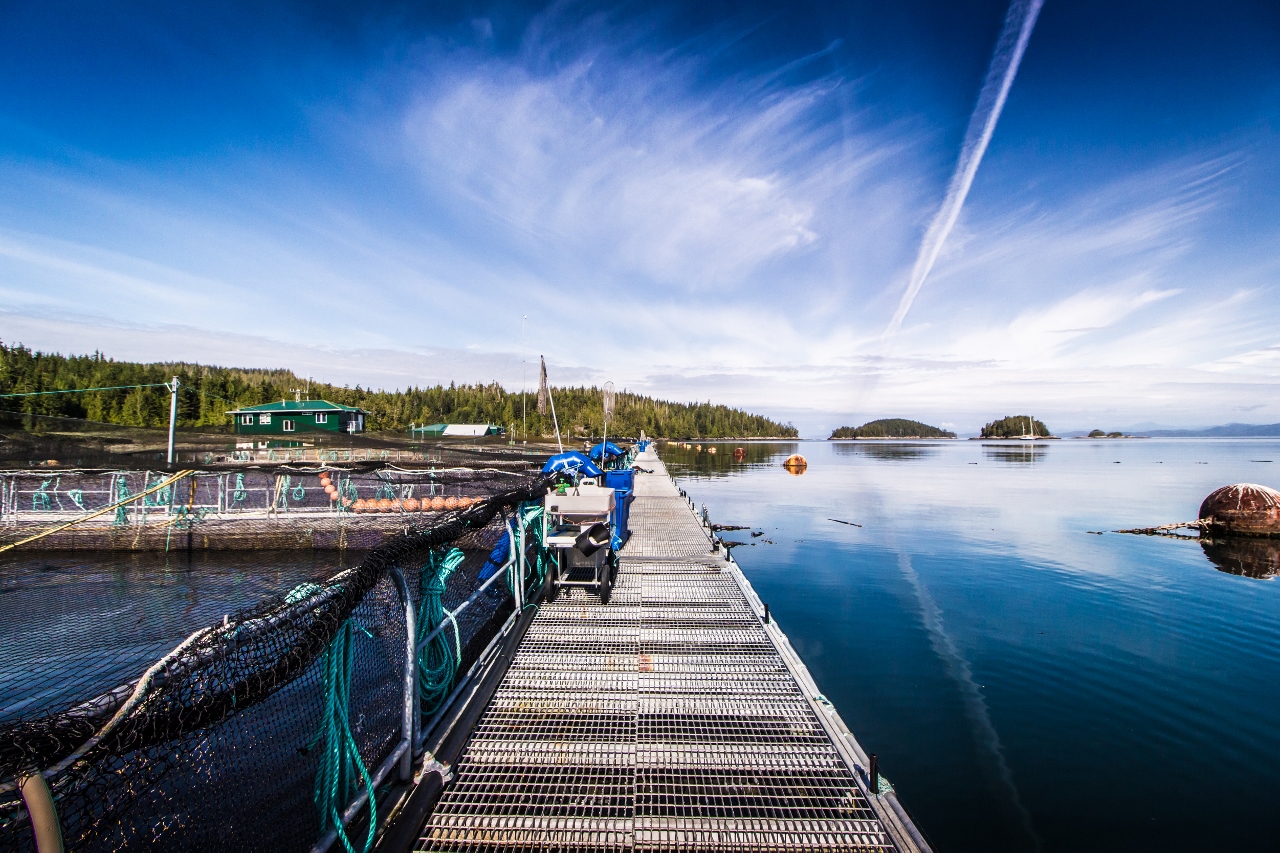Dinner time? Leave the fish off your plate

Fish farming has a horrible catch.
It began after at least 305,000 lice-ridden and grotesquely deformed salmon from a Washington pen escaped into Canada this summer. The public was instructed to catch as many of these fish as possible to prevent them from spreading disease to wild salmon, whose numbers are already suffering. Fishers were surprised to find that the fish were unhealthy, with injuries from rubbing against the pen and malformed mouths, probably a result of poor farm conditions.
The release of new footage taken at two salmon farms near Broughton Island, B.C., in the traditional territory of the Musgmagw Dzawada’enuwx Nation, came at the same time. The footage shows disfigured and blistered fish suffering open sores, sea lice, genetic defects, and even blindness.
First Nations people have voiced opposition to fish farming in their traditional waters for 30 years and have even handed out eviction notices to fish farming corporations like Cermaq/Mitsubishi. They are certainly on the right side of history. The fishing industry not only destroys our oceans, it also creates a nightmare for fish and feeds people diseased food.
But let me back up: fish farming affects us all, even if few of us know much about it.

Fish feel pain and pleasure
More than 50 per cent of the fish we eat are farmed, and that number is growing rapidly (about nine per cent per year for the past three decades). That is devastating news for fish who suffer in crowded tanks, battling for food and enduring deadly parasites, overcrowding, polluted water, and more.
Despite looking so different from us, fish are intelligent and feeling animals. In fact, scientists worldwide have noted time and again that fish experience pain in much the same way land animals do. Fish are also comparable to dogs, cats, and other animals in the way they feel pleasure. When they are free to live in peace, they have even been known to enjoy underwater spa treatments. (Yes, really.)
Sadly, factory-farmed fish never know freedom. Often they are left to suffocate in open air or on ice, a process that for some species takes hours. A 2016 study published in the Royal Society Open Science noted that under the poor conditions of factory fish farms, many salmon actually stop swimming and eating — these “dropouts” are an all-too-common phenomenon.
Eating wild-caught fish is no better. Wild fishing is also destroying our environment. According to the Food and Agriculture Organization of the United Nations, about 32 per cent of the world’s wild fish are exploited at an unsustainable rate. Almost one-third of all the ocean’s fisheries are being overfished, depleting our oceans of species every day.
What’s more, beloved animals such as sea turtles, seals, small whales, porpoises, and dolphins are killed in the process. Countless unwanted animals, known in the industry as “bycatch,” are swept up in massive nets along with targeted species. They either get tangled and die in the nets under water, or slowly suffocate on board commercial fishing vessels. According to The National Journal, an estimated 20 per cent of all fish caught by commercial fisheries is bycatch.

Plastic in their guts
Additionally, wild fish from our polluted oceans are highly contaminated. Climate change could boost mercury levels in fish by up to seven times the current rates. But just recently, a whopping 25 per cent of fish tested from markets in California and Indonesia had plastic in their guts. Seafood eaters each ingest up to 11,000 tiny pieces of plastic every year, and dozens of particles become embedded in tissues.
But you may ask, “What about getting those Omega-3s?!" Luckily, you can easily find them in plant sources, such as walnuts and flaxseeds. You’ll reap all the heart-healthy benefits but none of the contaminants. Fish contain omega-3 fatty acids only because they themselves obtain it from plant sources, such as algae. There is simply no health justification for humans to consume fish.
We at Mercy For Animals urge companies — at a minimum — to require their salmon suppliers, including hatcheries that provide to suppliers, to achieve mandatory welfare improvements by a specified time. Improvements should include provision of a safe, clean, and uncrowded environment where health and welfare are regularly monitored; prevention, monitoring, and immediate treatment of disease outbreaks; handling that is minimal and optimizes welfare; and reduction of animal suffering through careful feeding practices, including decreasing the number of wild fish fed to farmed salmon.
While factory fish farmers have a moral responsibility to remedy this awful situation, we as consumers can withdraw our support from this cruel industry altogether. Leave fish off your plate — for our oceans, our own health, and these exploited animals.






Comments
Wild Salmon jump. Farmed Salmon do not. Wild Salmon act totally different than Farmed Salmon. The poor Farmed Salmon cannot jump to get rid of their lice. They are bathing in it. It's like these fish are marinating in poison.
https://news.cnrs.fr/articles/a-deep-blue-challenge